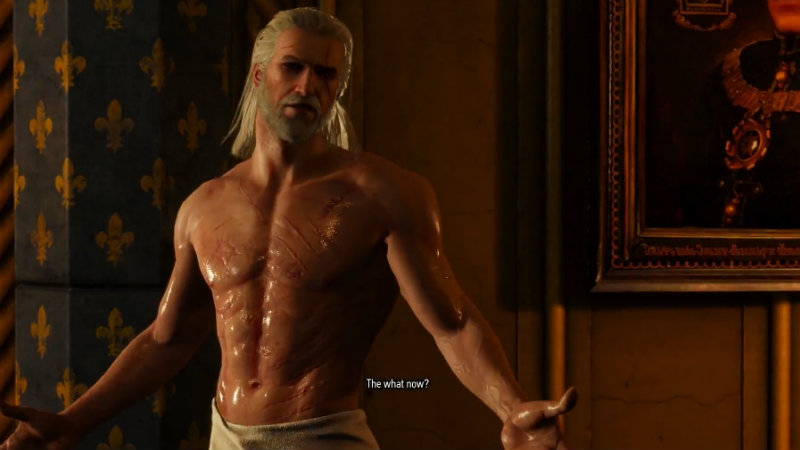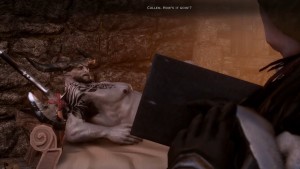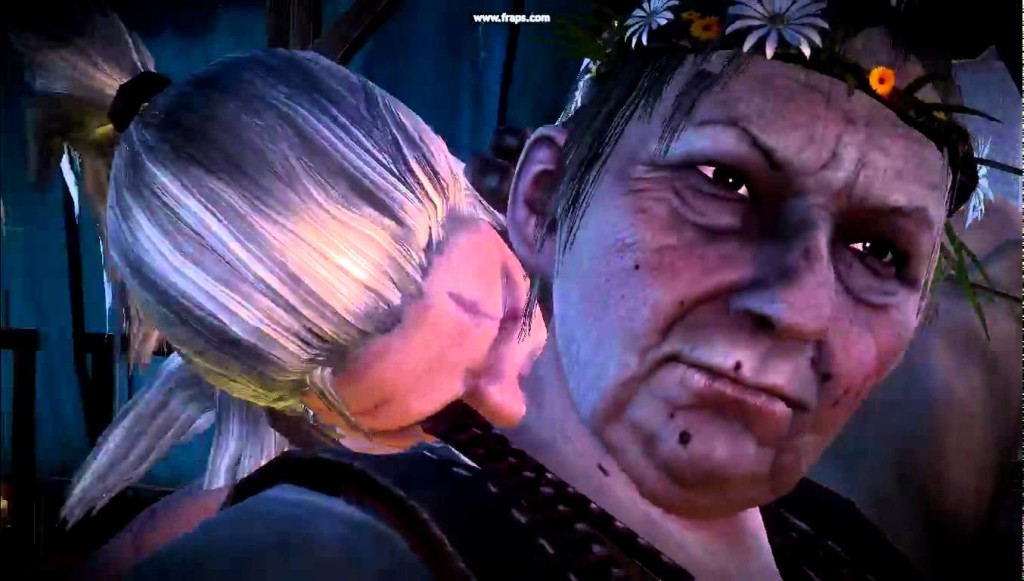I don’t think any subject should not be written about. Nor do I believe that the word “forbidden” should be taken at face value. But I do believe that writing is a cooperative act: as you shape the piece, the piece also shapes you. And some subjects will carry you over a terrible threshold from which you will emerge forever stained, forever tainted.
This blog post is that threshold.
We’re gonna talk about sex scenes in video games.

So, this all came about from an article on Kotaku by Nathan Grayson titled “The Complicated Women of The Witcher 3.”
It’s an interesting article breaking down the various relationships in the new video game, The Witcher 3: The Wild Hunt. And while I’m overall pretty pleased with what it says, it’s a touch derisive of the testosterone-fueled libido of the video game. And it’s hardly alone in this. People have complained about the Witcher’s relationships before, complaints about them ranging from “misogynistic” to “weird,” but usually settling somewhere in the realm of “childish.”
I guess I can get that.
The world of The Witcher is unrepentantly low fantasy. It’s political, it’s grimy, it’s gritty. There’s a thin layer of filth over just about everything. The peasants are greasy, there are geese and barnyard animals running around in the muddy streets, pox-scarred soldiers have bright red noses from all the vodka they’ve been drinking.
And I don’t know if anyone else noticed this, but in your meanderings through the various cities, you can hear people spitting in the streets. A lot. The nasally snort-then-hock kind of spitting. Like, you can’t help but wonder if everyone ate a lot of cheese just before you got there.
What I’m saying that the world of The Witcher is a pretty filthy place.
Except for one aspect.
The protagonist himself, Geralt, who stands as a shining paragon against all this filth. He routinely gets into fistfights with nobles (and wins). He outwits trolls and does bargains with dark spirits and comes out unscathed. He battles tremendous beasts, horrifying monsters and vicious creatures who defy explanation and the worst he gets out of it are some scars that only make him look more badass (see above).
Geralt is a pretty unrepentant power fantasy.
I know people more familiar with the series than me are about to nitpick and provide anecdotes as to why this isn’t the case, but hear me out.
I actually really enjoy the sheer unabashed fury with which this game throws itself. The Witcher 3 throws itself, wholeheartedly, into what it does. Geralt is a lone warrior in a world full of filth. He swings a big-ass sword, throws a shit-ton of bombs and has sex with ridiculously beautiful women (in fairness, this is because said women cast spells on themselves. I have no idea if Geralt’s ever had a nice date with a milkmaid or something).
(EDIT: Turns out he has).
Indeed, even Grayson’s articles suggest that the sexual relationships aren’t all that bad.
But I think the above explains why people are so quick to brand The Witcher as immature: it is a power fantasy. What’s more, it’s a typical power fantasy. Beautiful women are wildly attracted to Geralt and they have sexual congress atop a unicorn (this only happens once, but still). There’s no pitching woo, there’s no getting to know your romantic liaisons, there’s no offering gifts and quiet conversations.
There’s no romance.
And we nerds love our romance. We love our slow burn build-up relationships, our “will they won’t they” unresolved sexual tension, our highs and lows of romantic. That’s why we love Bioware.

Yeah.
Bioware’s latest, Dragon Age: Inquisition, gets a lot of props for its portrayals of romance. And they’re definitely deserved. Inquisition features characters of a lot of different backgrounds, a lot of different sexual preferences, and really tasteful explorations of each. They’re exciting without seeming exploitative and they’re never really crude or crass.
Dragon Age: Inquisition is as unrepentant in its approach to romance as The Witcher 3 is, even if they go in different directions. Really, Bioware has taken a lot of great steps forward and deserves the credit it’s been getting.
But is it “mature?”
So, here’s the thing: I know this is technically not the way the game needs to be played, but I also know this is typically the way the game is played.
You have companions that you go on adventures with. Some of them are men, some of them are women. They all have diverse opinions–Cassandra prefers a more authoritarian approach, The Iron Bull is more willful and devil-may-care. Some of these companions, you can have a romantic tryst with, up to and including sexual congress, assuming that you connect on a level.
Presumably, the idea is that, regardless of your desire to play as a free-thinking rebel or a careful, considerate paladin, someone out there will love your personality.
In execution, you more often wind up going the other way around: identifying which companion you are most attracted to and then slowly shaping your opinions around the goal of getting them to be romantic with you.
Having a personality is not necessary. In fact, it’s kind of discouraged. If you want to romance Cassandra, you had better agree with her about what to do with those mages. But if you change your mind and want to romance Sera, you can get more self-absorbed and chaotic and she’ll adore you for that.
It’s almost creepy, in fact, in that it affirms a reasonably-criticized outlook that a relationship is a reward for doing certain tasks. I think this appeals to a lot of our nerd beliefs that hard work will be rewarded over dumb luck. Have the right opinions, say the right things, you win sex. I don’t think Bioware intended for this to happen. It just kind of did.
And there’s nothing particularly wrong with that. The idea that two people shape each others’ opinions and come around to liking each other based on that is something that happens in real life. But so is the idea that two people can be instantly attracted to each other on something deeper and more primal and it culminates in near-immediate sex.
Like in The Witcher 3.
As a man who has put enough hours into both games to both have delighted at having sex atop a stuffed unicorn and to have been genuinely upset that I couldn’t romance Cassandra as a female Inquisitor (why), I’m obviously not here to judge either game, so much as I am kind of weary of this attitude toward sex that it must be uniformly one thing.
I’ve ranted about this before, of course. Many times. Farmers in Spain plan their crop rotation based on the reliable frequency with which I rant about sex in fantasy fiction. But I think it’s a subject we still need to talk about.
Because I think, of the two games, I agree more with The Witcher 3’s take on it.
I feel like Inquisition’s method of pursuing relationships is very much a method we’ve grown up with, rooted deeply in fairy tales: complete a quest and affection, be it physical or emotional, is your prize. Whereas The Witcher 3 has a more primal feel to it, instant attraction that is instantly acted upon, which certainly can feel like something we, as nerds who often went long periods of time without affection or attraction, can relate less to.
Basically, what I’m saying is that when you look at either instance, they’re both kind of silly.
And sex frequently is.
It’s kind of gross, oftentimes awkward and sometimes ends in crying and apologies. But it is also a part of life for a lot of us. And even those of us who abstain from it are affected by it and everyone’s attitude on it. The act and the feelings surrounding it shape us, as we shape it. It’s biological, but it’s also romantic and spiritual and leads to hurt feelings and heightened stakes and difficulties and release and all sorts of crazy crap.
As critics of both games and books, we tend to only really look at the act itself and make our judgment off of that, rather than look at the surrounding aspects and making our judgment from that.
Dragon Age: Inquisition is a strange and off-putting game if you look at the process of saying the right things to be rewarded with sex. But if you look at it as a story of people learning to trust each other, it’s actually quite beautiful.
The Witcher 3 is a very hormonal power fantasy about a dude who walks around swinging a big-ass sword and getting sexy witches to sleep with him. But if you look at the surrounding story of protecting your loved ones and exploring your intimacy with them, it’s pretty lovely.
In a lot of ways, video games and fantasy and nerds have come a long way toward looking at sex. In a lot of ways, we are still awful at it. And expecting it to all fit a uniformly objective standard, instead of looking at it like the awkward nexus of feelings and emotional stakes it is, is one of the ways we could stand to improve.
So bone on, I guess.

Some good insight here. Really, all living beings are innately programmed to desire sex, whether for pleasure or procreation. So to leave it out or gloss over it as unimportant is to deny that whole dimension. Sex gives and means so much: affection and passion, obviously, but also comfort and vulnerability, a sense of power too (it is an awesome feeling to know that if I do *this* I get *that* reaction). Not that I think sex should be salacious or vulgar in writing or film, but realistic in the effect it has on people, and what it means for relationships.
Well, excepting folk identifying as asexual, I agree. But you’re right, it’s something we need to look at.